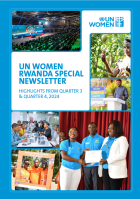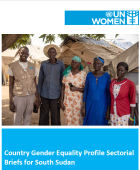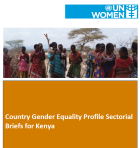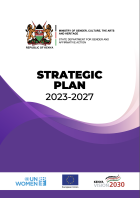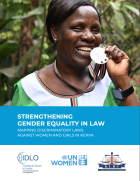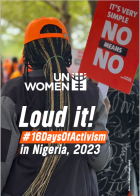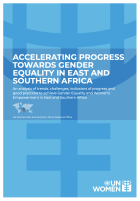1 - 20 of 42 Results
Pagination
Date:
This newsletter highlights some of UN Women`s key milestones made in advancing gender equality and women`s empowerment in Rwanda in the period of July - December 2024
Date:
In 2022, MGCSW and UN Women South Sudan developed the Country Gender Equality Profile, highlighting progress and challenges in gender equality, women’s rights, and governance. The study calls for increased funding, legal reforms, and socio-economic initiatives to address issues like illiteracy, violence, and limited access to services. Collaborative action by the government, UN agencies, and civic groups is essential for promoting gender equality and safeguarding women’s rights. Key recommendations include allocating funding for violence survivors, establishing the Women Enterprise Fund, reviewing the Girl Child Act, and expediting gender-related laws. The government should lift social media bans, provide platforms for women’s voices, and promote women’s inclusion in constitution drafting. Efforts should also focus on disseminating the Maputo Protocol and defining the minimum marriage age to safeguard gender equality and women’s rights.
Date:
While progress has been made in gender equality policies and peacebuilding, women face structural barriers. The study recommends strengthening legal frameworks, institutional structures, and socio-economic initiatives, urging collaboration among government, UN agencies, civil society, and partners to advance gender equality and women’s empowerment.
Date:
These policy briefs, form part of the Country Gender Equality Profile (CGEP), evaluates gender equality in Kenya, offering evidence-based insights for stakeholders to advance commitments to Gender Equality and Women’s Empowerment (GEWE). Guided by the EU Gender Action Plan 2021–2025, they promote inclusive, transformative approaches to inform programmes, policies, and actions, addressing diverse gender needs and advancing Kenya’s Sustainable Development Goals (SDGs) through national and county-level collaboration.
Date:
The Publication is a detailed strategic plan for the period 2023-2-27. It highlights previous achievements, lessons and emerging issues that define the policy direction of the gender sector achieving a society free from gender discrimination and violence
Date:
The documentation of good and promising practices from the Social Institutions and Gender Index (SIGI) study will act as a guide to further gender equality in Tanzania.
Date:
UN Women and International Development Law Organization (IDLO), in partnership with the Kenya Law Reform Commission. Researcher/writer: Dr. Consolata Ngondi; Ms. Petronella Mukaindo
Date:
The objective of the present study is to present an overview of the adjusted gender pay gap and labour-market inequalities in The United Republic of Tanzania. This is part of a larger 2023 UN Women study titled “Why Women Earn Less: Gender Pay Gap and Labour-Market Inequalities in East and Southern Africa.”
Date:
The objective of the present study is to present an overview of the adjusted gender pay gap and labour-market inequalities in Uganda. This is part of a larger 2023 UN Women study titled “Why Women Earn Less: Gender Pay Gap and Labour-Market Inequalities in East and Southern Africa.”
Date:
The objective of the present study is to present an overview of the adjusted gender pay gap and labour-market inequalities in South Africa. This is part of a larger 2023 UN Women study titled “Why Women Earn Less: Gender Pay Gap and Labour-Market Inequalities in East and Southern Africa.”
Date:
The objective of the present study is to present an overview of the adjusted gender pay gap and labour-market inequalities in Rwanda. This is part of a larger 2023 UN Women study titled “Why Women Earn Less: Gender Pay Gap and Labour-Market Inequalities in East and Southern Africa.”
Date:
The objective of the present study is to present an overview of the adjusted gender pay gap and labour-market inequalities in Malawi. This is part of a larger 2023 UN Women study titled “Why Women Earn Less: Gender Pay Gap and Labour-Market Inequalities in East and Southern Africa.”
Date:
The objective of the present study is to present an overview of the adjusted gender pay gap and labour-market inequalities in Namibia. This is part of a larger 2023 UN Women study titled “Why Women Earn Less: Gender Pay Gap and Labour-Market Inequalities in East and Southern Africa.”
Date:
The objective of the present study is to present an overview of the adjusted gender pay gap and labour-market inequalities in Mozambique. This is part of a larger 2023 UN Women study titled “Why Women Earn Less: Gender Pay Gap and Labour-Market Inequalities in East and Southern Africa.”
Date:
The objective of the present study is to present an overview of the adjusted gender pay gap and labour-market inequalities in Mauritius. This is part of a larger 2023 UN Women study titled “Why Women Earn Less: Gender Pay Gap and Labour-Market Inequalities in East and Southern Africa.”
Date:
The objective of the present study is to present an overview of the adjusted gender pay gap and labour-market inequalities in Kenya. This is part of a larger 2023 UN Women study titled “Why Women Earn Less: Gender Pay Gap and Labour-Market Inequalities in East and Southern Africa.”
Date:
The objective of the present study is to present an overview of the adjusted gender pay gap and labour-market inequalities in Ethiopia. This is part of a larger 2023 UN Women study titled “Why Women Earn Less: Gender Pay Gap and Labour-Market Inequalities in East and Southern Africa.”
Date:
The Burundi Country Gender Equality Profile (CGEP), 2023 edition scans the horizons and outlines the prospects for gender equality in Burundi with a view to creating an overview and establishing a baseline on the situation of Gender Equality in the country.
Date:
This document gives an overview of the activities carried out during the 16 Days of activism 2023 Campaign in Nigeria.
Date:
The Report highlights the imperative and urgent need to have men, along with women, become gender equality activists and work towards violence-free, inclusive societies. An important reflection on masculinity sheds light on how toxic masculinity models not only harm women and girls, but the majority of men and boys too. In this regard, gender equality really matters for both men and women, and requires both to join their efforts to realize it.

